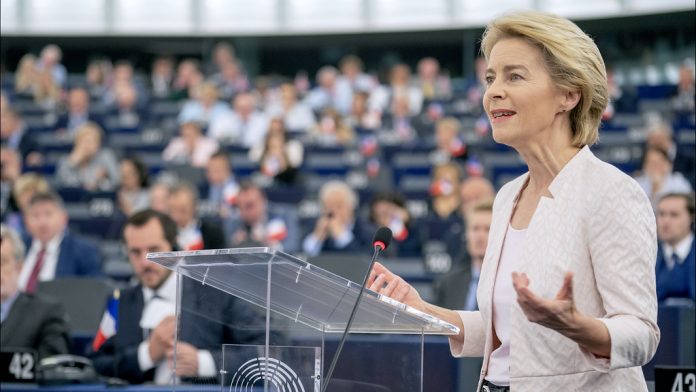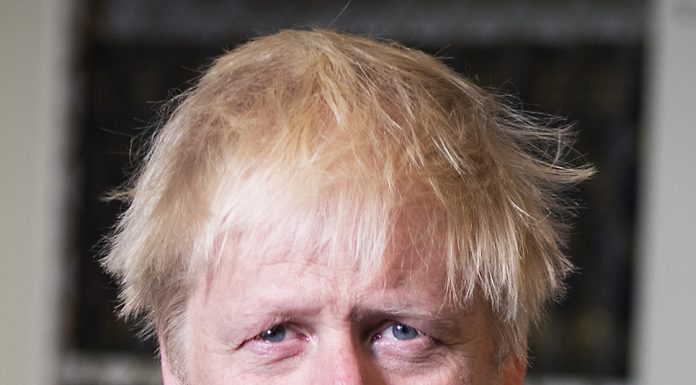
Yesterday, European Commission President Ursula von der Leyen gave her so-called “State of the Union speech”, addressing MEPs in Strasbourg. It may surprise that someone who’s supposed to be a bureaucrat, having been appointed to what amounts to an administrative position, is making these kinds of grand political statements, but we are where we are. The European Commission now considers itself to be a “political” body.
Two members of von der Leyen’s Commission did not seem overly excited about her speech, as they considered it a good time to engage in some knitting:
Now that is what I call productive 🇪🇺EU Commissioners 😀. #SOTEU https://t.co/lCXiFOrQok
— Pelle Geertsen (@pellechristy) September 15, 2021
Also the Slovenian EU Presidency did not send a delegation to attend the speech, given the many differences between the rather Eurosceptic PM Janez Janša and the European Commission.
In any case, it’s useful to take a closer look at what the President of the body with the monopoly to initiate EU regulation – which according to some estimates accounts for two thirds of the impact of all regulation in the EU – has in store for citizens.
Here's my intervention on @euronews, discussing the "State of the Union" speech by @vonderleyen (From 2'19):https://t.co/5UOI3VDhOL
#SOTEU— Pieter Cleppe (@pietercleppe) September 15, 2021
New Powers:
True to form, the Commission President’s speech included a whole range of proposals for extra transfers of powers to the EU level. Some of these had already been announced, others not:
- The European Commission proposes to create yet another new EU agency, called “Health Emergency Preparedness and Response Authority” (HERA). Health policy is mostly a national competence –even if the EU is responsible for the approval of medicines – so this marks quite a big shift. In her speech, von der Leyen defended the EU’s track record on vaccine procurement. Even if it’s true the EU did get its act together later this year, at least during the first quarter of 2021, when the “third wave” of Covid raged, it was clearly behind the UK, the U.S. and Israel, resulting in extra health damage, with the European Commision bearing a large part of the responsibility. This rather shaky track record does now not stop the EU from requesting extra powers over health policy. Apart from this proposed new agency, the Commission is also pushing for a “European Chief Epidemiologist” and for the ability of the EU to trigger an EU-wide State of Emergency.
- From 2022, the European Commission’s “Rule of Law reports” “will come with specific recommendations to Member States.” This should also raise eyebrows. As important as it is to support the rule of law in EU member states, it should be left to national democracies to figure out how to safeguard the rule of law. If there is one thing the European Commission can do to support the rule of law in those member states where corruption and cronyism are often linked to EU funds, it is to no longer transfer EU funds over there. Yet, the Commission has been a big cheerleader over the last year for more EU transfers, managing to get its desired 800bn euro “recovery fund”, financed by joint debt issuance, up and running.
- In her speech, Von der Leyen devoted quite a bit of attention to defense, something else which isn’t the EU’s core business, thereby even suggesting that NATO can no longer be the main bedrock of European global positioning, as she stated: “If Europe is to become a more global player, it also needs to focus on the next generation of partnerships”. She thereby urged the EU “to do more on its own” and to develop a “European Defence Union”.
To realise this, she proposes … yet more bureaucracy: an “EU Joint Situational Awareness Centre”, serving “to fuse all the different pieces of information” relating to defense. She also proposed
“waiving VAT when buying defence equipment developed and produced in Europe”, something which could in theory provide an advantage to inferior military equipment when this would have been produced in the EU. On top of that, she also supports a “European Cyber Defence Policy, including legislation on common standards under a new European Cyber Resilience Act.”
Earlier, such proposals have been criticised, especially by Eastern European and more NATO-reliant EU member states, for amounting to duplication of scarce military capacity and financial resources.
New EU regulations:
- The “European Green Deal” was launched over the last year, and this is now firmly on the EU legislative track, where the incoming French EU Presidency will hopefully scrap the worst excesses of some of the climate fanaticism it contains. Because of this reason, it didn’t get all that much attention in von der Leyen’s speech.
- Von der Leyen also wants “a new European Chips Act”, aimed at bringing semiconductor production back to the EU, to safeguard “our security of supply” and to “develop new markets for groundbreaking European tech.” This is strongly inspired by “France’s dirigiste tradition”, embodied by EU Internal Market Commissioner Thierry Breton, as Euractiv puts it, and “not without controversy in the European Union, especially for Nordic countries that are historical defenders of an open economic model.” Just in case anyone still had any doubts who’s calling the shots at the EU Commission (hint: not the Nordics or the “Hanseatics”).
- Tax competition is one of the great disciplines imposed on governments, a dynamic enabled by the EU, but you wouldn’t know it when listening to von der Leyen, who’s stressing that “we will do everything in our power to seal the historic global deal on minimum taxation.”
More EU spending:
It is not unfair to consider throwing money at challenges the EU’s way of trying to solve them. Noblesse oblige, so also here, von der Leyen’s speech is rife with new spending initiatives:
- The EU’s new Health Emergency Preparedness agency, HERA, is supposed to receive “50 billion euro by 2027”
- “An additional 4 billion euro for climate finance until 2027.” – on top of the “25 billion dollars per year” the EU is already spending
- “We will increase again humanitarian aid for Afghanistan by 100 million euro”, the Commission chief announced. Supposedly, that money won’t end up in the hands of the Taliban gang which is now terrorizing the country? The EU’s track record on directing its development aid cash directly to the state budgets of shady regimes isn’t inspiring confidence here.
- “One billion Euro to ramp up mRNA production capacity in Africa”
- EU funds for a new EU program, called “Alma”, for “youth who do not work or study – similar to Erasmus, aimed at providing short-term work experience. Apart from the risk that this turns out into some kind of subsidized tourism, there already exists a similar scheme, the “EURES Targeted Mobility Scheme (TMS)”, intended to help adults to find a job, traineeship or apprenticeship in an EU member state, Iceland or Norway. Von der Leyen can be forgiven to be lost in the subsidy jungle of her own EU budget.
- A new grand EU spending scheme to counter China’s Belt and Road, which will be named “Global Gateway”. In a bid to challenge the Chinese Communist Party, the EU is mimicking its methods. Perhaps the name “White Elephant Route” could have been more appropriate.
Commission says EU "was not informed" about AUKUS deal from the involved parties. The announcement came hours after von der Leyen's attempt to counteract Chinese influence with a "global gateway" and today's Indo-Pacific strategy that has been blown out the water so to speak 🛥️
— Mehreen (@MehreenKhn) September 16, 2021
New Summits:
Another standard EU method to meet challenges is to organize Summits. Two new Summits were announced in the speech: one on European Defence and the other on EU-Africa relations, conveniently timed in the midst of the French Presidential election campaign, as French President Macron hopes to be re-elected.
What’s missing in the speech:
Not mentioned were the relationship with the UK – which is more and more being dealt with at the diplomatic, non-political level – and things like antisemitism and Syria.
Even more lacking was any aspiration to get the EU back to focus on what should be its core business: scrapping trade barriers and policing state aid. On the latter front, it’s hard to think of one crony deal or subsidy von der Leyen’s European Commission has not permitted during the orgy of state aid unleashed following the Covid crisis.












